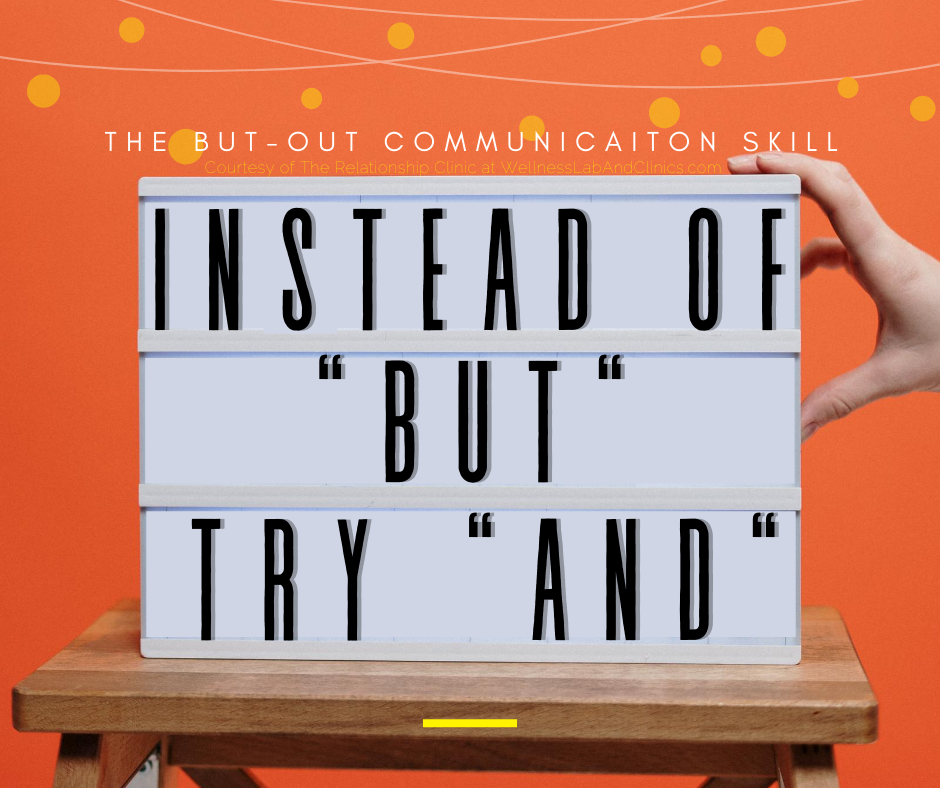The But-Out Communication Skill
/“My partner just won’t listen to me.”
“No matter what I say, they take it the wrong way.”
“I feel I can’t say anything right?”
“What else is there once we can’t hear each other anymore?”
As humans we have an innate skill for sensing and responding to threat. We feel it in our gut or the hair on the back of our neck begins to crawl, we have a sense of wanting to hang up, fall to the ground, drive away or just zone out completely. We know these as the intuitive reactions of our sympathetic nervous system (fight, flight, freeze, or fawn). It’s how we innately behave when we feel unsafe or insecure or even sense a bit of doubt or uncertainty.
We can be thankful for these reactions; it comes from a great place - an internal mechanism that serves to preserve and protect. These innate defense responses can be seen in our relationships when we react to perceived threats with retaliation, retreat or compliance. You may see it in yourself or notice it in the responses of others around you.
Let’s insert the important note here that humans are wired for secure connection - yes, some more than others, but that’s another chapter.
Our communication within relationships has adapted significantly through the ages. Interestingly enough, some words and phrases may continue to trigger a similar antiquated sense of threat and defense, and we may feel it is necessary to act in order to preserve what we need for survival.
Notice how this reaction can often happen in our important relationships. Here’s the thing: it doesn’t have to. This is your exclusive permission to try something new.
The simple shift:
In communication, the word “but” is one of those words that often triggers defense. We consciously or subconsciously start to identify what the conditions are when we hear the word “BUT.”
Now, let’s look at one way our internal responses can ease when we are experiencing and reinforcing healthy connection with each other. In this practice, we are intentionally working to transform a conversation from one of opposition to one of connection.
I call this the “But-Out Communication Skill.”
When we deliberately pivot the statement from a conditional phrase (“BUT”) to one of reinforcement (“AND”), it shifts and fortifies the growing intimacy and secure connection relationships need to experience growth and sustainability.
Instead of engaging our sympathetic nervous system (fight, flight, freeze, or fawn), our parasympathetic nervous system can engage (what some call the “rest and digest” reaction). A healthy bond becomes strengthened and the “rapid fire” or the “comply and hide” responses we exert when we feel our key relationships may be in danger begin to diminish.
This strategic modification can help the individual and the relationship experience security and growth.
Consider how the “But-Out Skill” can flesh out in many key relationships we have:
The parent-child:
”I love you, BUT you really need to begin doing your own laundry.”
But-Out…
”I love you, AND you really need to begin doing your own laundry.”
The supervisor-employee:
”You’re a dependable worker, BUT you need to be more efficient.”
But-Out…
”You’re a dependable worker, AND you need to be more efficient.”
Intimate partners:
“I love the life we are making together, BUT I really need you to talk with me before making another big Amazon purchase”
But-Out…
“I love the life we are making together, AND I really need you to talk with me before making another big Amazon purchase.”
——
When we substitute the conjunction “AND” for the word “BUT,” the original message can remain the same while the defensiveness is mitigated because the conditions have been removed from the equation. It is no longer “I love you, BUT …” and becomes “I love you, AND ...” Welcome to healthier relationships with continued understanding.
It’s funny how an elementary grammatical detail as simple as a conjunction can have such fundamental parallels in fostering healthy relationships with others. This practice is a simple one with profound benefits. Try it out - see what you think!


